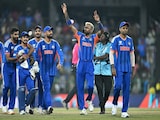- The Supreme Court questioned if non-citizens with Aadhaar should get voting rights too
- Aadhaar does not confer citizenship or automatic right to vote, said the bench
- Election Commission can verify documents in voter inclusion applications: court
Raising concerns over intruders who managed to get Aadhaar cards, the Supreme Court has asked whether a non-citizen with an Aadhaar card should be given voting rights too. Aadhaar, the court said, is to ensure social welfare benefits reach everyone, and this document must not automatically confer the right to vote.
The bench of Chief Justice of India Surya Kant and Justice Surya Kant is hearing petitions challenging the validity of the Election Commission's move to conduct Special Intensive Revision (SIR) of voter lists in several states.
The bench reiterated that an Aadhaar card does not "confer absolute proof of citizenship". "That is why we said it will be one of the documents on the list of documents. If anyone is deleted, they will have to be given a notice of deletion," it said.
The Aadhaar Act makes it clear that it does not confer citizenship or domicile.
"Aadhaar is a creation of statute for availing benefits. Just because a person was granted Aadhaar for ration, should he be made a voter also? Suppose someone belongs to a neighbouring country and works as a labourer," the Chief Justice said.
The court also said that the Election Commission has the jurisdiction to determine the correctness of documents submitted with a Form 6 application seeking inclusion in a voter list. The poll body, it said, is not a "post office".
The Supreme Court also fixed the schedule to hear petitions specifically challenging SIR in Tamil Nadu, Kerala and West Bengal. The bench has asked the Election Commission to file responses by December 1. The petitioners can then file their rejoinders and the matters will be taken up soon after.
Earlier, appearing for some petitioners, Senior Advocate Kapil Sibal said the SIR raised fundamental concerns about democratic participation. He said SIR places an unconstitutional burden on ordinary voters, many of whom are illiterate. "Filling up the forms is not the responsibility of the elector. So many are illiterate and do not know how to read and write. If they cannot fill forms, they will be ousted (from electoral rolls)," he said, urging the court to focus on constitutional safeguards rather than procedural justifications.
He said once a voter's name is included in the electoral roll, the presumption of validity follows unless the state proves otherwise. "Any exclusion must follow a process which is reasonable and fair."
Sibal argued that while Aadhaar is not conclusive of citizenship, it is a presumption in the holder's favour. "There is a presumption in my favour. I have an Aadhaar. That is my residence. You want to take it away... take it away by a process and let the process be proven before this court," he said.
Justice Bagchi, however, stressed the need to weed out dead voters, noting that lists were publicly displayed in panchayats and on official websites. "We do not judge in a vacuum," he said. The hearing will continue today.















